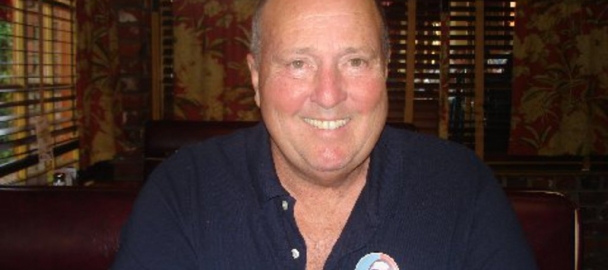
Sometimes a tragic or sudden event happens that forces you to really look at your life and take action. This scenario came as a blessing in disguise for David Hanbidge as a personal loss helped him overcome lung cancer.
In Spring 1999, David’s father was losing his battle with lung cancer. It was a tough time for him because he was traveling across the country to be with his father during his final days. However, during this time period, and even a few months before that, he started to notice that he was experiencing heaviness in his chest to the point that he often started wheezing.
Unfortunately, David’s father passed away early that summer. Even through everything, David’s condition still remained the same so he decided to finally go see his doctor. His doctor initially said that his conditions were allergy related, but an x-ray revealed that the lower lobe of his left lung was collapsed and he had pneumonia.
David still wasn’t convinced.
In Sept., David came to Long Beach Medical Center to see pulmonologist Cameron Dick, M.D. to get a bronchoscopy and the results were shocking. At the age of 56, David was diagnosed with small cell lung cancer.
About 10 – 15 percent of all lung cancers are small cell lung cancer. Small cell lung cancer often starts near the center of the chest, and tends to grow and spread quickly. Even with this troubling news Dr. Dick had some promising advice for David.
“He told me that Long Beach Medical Center has one of the best lung cancer physicians in the area and he recommended that I go see Robert Nagourney, M.D., because he has survivors of small cell lung cancer,” says David. “Dr. Nagourney didn’t pull any punches when I went to go see him he was very honest with me saying that I was in trouble but that there was a treatment that he could do called tumor cell testing.”
“When David was diagnosed with small cell lung cancer, one of the most lethal forms of cancer, I made sure to explain the journey and the risks that he would confront,” says Dr. Nagourney. “I told him that a surgical biopsy would be necessary to obtain living tumor tissue for analysis and that the laboratory results would identify the treatments most likely to kill his cancer.”
Tumor cell testing is when a physician takes a piece of cancerous tissue and tests it against different types of chemotherapy to see which one causes abnormally positioned cells to die the fastest. This type of testing was considered experimental, and wasn’t covered by insurance, but David was convinced that this was his best chance to beat his cancer.
David had surgery to remove the lower lobe of his left lung. After the surgery, his surgeon told him that the lung cancer was all in that one portion that they removed. However, with no guarantees that all the cancer was removed, and to prevent it from coming back, David underwent chest radiation twice a day for a month and chemotherapy for 11 months.
David's fight against cancer wasn’t quite over because small cell lung cancer also can live or come back in the brain. After discussing his options with Dr. Nagourney, David decided on an additional chemotherapy treatment, to go along with one month of brain radiation, to finally rid himself of his cancer.
“David went through a few months of intensive chemotherapy and radiation,” says
Dr. Nagourney. “Although it wasn’t easy, at the end of it, David was in complete remission and today, more than 14 years later, he is one of a very few patients who are alive that can say that.”
After his long, hard-fought battle, David chose to celebrate by going to New Zealand and paragliding. He knows that without the help of Dr. Nagourney, and Long Beach Memorial, he wouldn't be able to say that he has been cancer free for 14 years.
"Without Dr. Nagourney, and his advice to go with tumor cell testing, I wouldn’t be here today," says David. "I can’t thank him, and Long Beach Memorial, enough because I wouldn’t be alive today without their recommendations, care and knowledge."